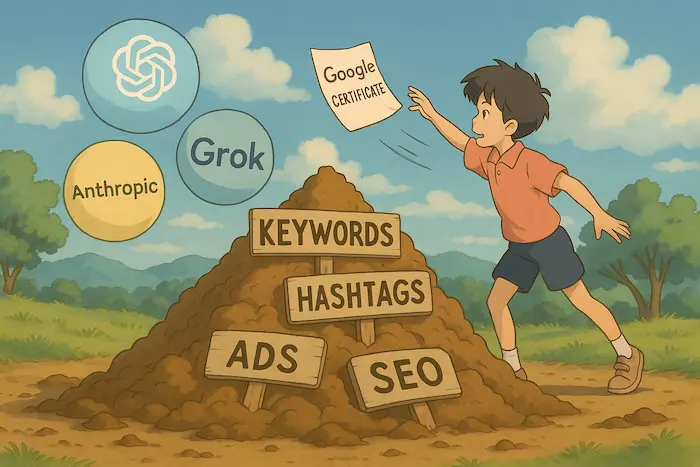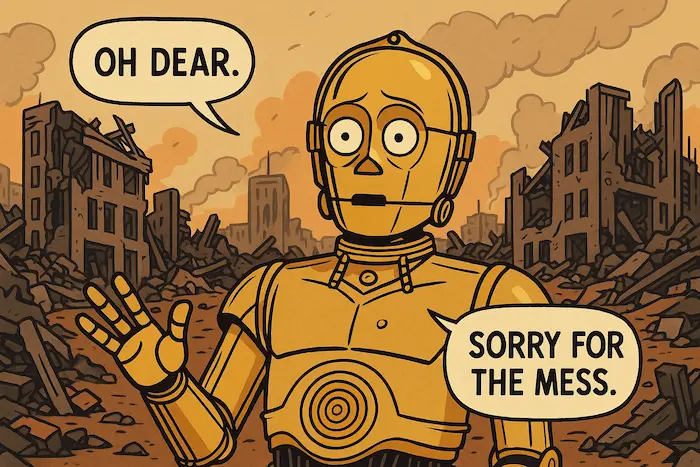If you've spent even five minutes scrolling through internet this year, you've probably seen the term AI agents tossed around like it's the new iPhone launch. They're everywhere… Some people paint them as omnipotent bots that'll reorder your groceries, run your startup, and maybe tuck your kids in at night. Reality check: chill. They're powerful, but not supernatural (yet). Let's unpack this.
What is an AI Agent?
In plain talk, an AI agent is like a digital intern who can operate on autopilot: they take goals, scout around, act on your behalf, and follow through, all without a human hovering nearby.
What it is:
- Autonomous yet goal-driven: once configured, it does the work, adapts if things go sideways, and keeps your goal front and center.
- Reactive and proactive: not just waiting for you to command it, it acts when needed.
- Self-aware-ish: meaning it can remember what it's done, re-check regularly, and adjust.
What it isn't:
- Not a magic chatbot that just "gets everything." It still needs context, setup, and boundaries.
- Not a self-appointed software dev replacing your engineers (yet).
A real-world story: agents at appfeed
At Launch IT, we built a clever AI agent for a client to monitor competitor content. Here's what those agents do:
Hunt for competitor information
They roam the internet using scraping techniques. When a site blocks them or throws a CAPTCHA, they retry intelligently, especially in terms of velocity. It just has all the context instantly, the technical and none technical it can reason, adapt and retry instantly without the need of a developer.
Spot similar content across places
They don't just pull headlines: they recognize when the same messaging appears elsewhere, on different platforms or domains.
Schedule reminders autonomously
Every hour, or maybe daily or weekly, whenever it's useful… they remind themselves to look again.
Craft messages
Once they've gathered data, they weave it into crisp summaries, fine-tuned with your brand's tone, and deliver it, be it to email, Slack, or wherever fits your workflow.
Think of it as Zapier on rocket fuel, automating the internet, with no human needed in the loop, and the power to code its own integrations as needed.
Why developers (and Tech PMs) still matter
AI agents aren't autonomous geniuses. They need configuration, permissions, and thoughtful context engineering. That means:
- You still write the setup: define what to scrape, where to watch, what to catch.
- You manage access: API keys, login credentials, injection points.
- You shape the logic: design how they act when things go sideways, how they parse results, and how they talk back to humans.
Sure, the toolset is getting slicker. Soon, maybe CEOs or seasoned marketers can configure these agents without dipping into code. But for now the custom wiring, the data wrangling, the nuance… it still needs skilled hands.
What can an AI Agent do? (tech vs human language)
Tech: Write code, APIs, integrations
Non‑Technical Explanation: It can glue systems together almost like digital duct tape.
Tech: Configure cron jobs or workers
Non‑Technical Explanation: It can wake up, do a task, then go back to rest—all on schedule.
Tech: Understand context and react
Non‑Technical Explanation: It knows what matters and reacts accordingly, not just blindly running.
Tech: Improve or learn over time
Non‑Technical Explanation: It can get smarter, learning your patterns or tuning itself.
Let me break it down further with our own use case:
- Code/integrations: The agent realized a competitor's blog changed structure mid-scrape, so it patched its own scraping logic on-the-fly. (Within limits, of course.)
- Cron-style scheduling: It didn't wait for you to ask: every morning, it'd check for new competitor posts on autopilot.
- Context understanding: It knew what counts as meaningful updates, like a new product release, not just a minor blog typo.
- Learning: Over a few runs, it stopped retrying failed endpoints that were down. Smart enough to skip, and move on.
The bigger picture: why this matters now
AI agents aren't a "one-day" thing, they're already in the wild. They're like well-trained interns: they need onboarding, clear goals, and supervision. But when done right, they shrink your busywork, surface insights at speed, and free your team to do more creative, problem-solving work.
At Launch IT, we see a future where configuring agents is part of even a non-developer's routine, like scheduling a Slack reminder. But until that day? Skilled technical people are critical to ensure an agent doesn't run crazy, scrape something it shouldn't, or get stuck in a loop of failure.
Final thoughts
Blind faith in agents as replace‑everyone magic is a trap. But dismissing them as hype is just as misguided. They're not your new CTO-yet-but they're not vaporware, either. If you're thoughtful about design, clear about objectives, and realistic about constraints… they're powerful allies.
If you are planning on getting started with AI Agents or want more information about what they are and what they can do for your business then give us a call. We have experience developing and integrating AI Agent solutions for customers across all sorts of industries and use cases.
One day these currently "limited" digital AI Agents will also take part in a mechanical body, this is when everything will change. The ultimate sidekick, assistant, AI Agent robot that is going to make everyone's life so much easier. Until then, stay tuned with the digital only version.




